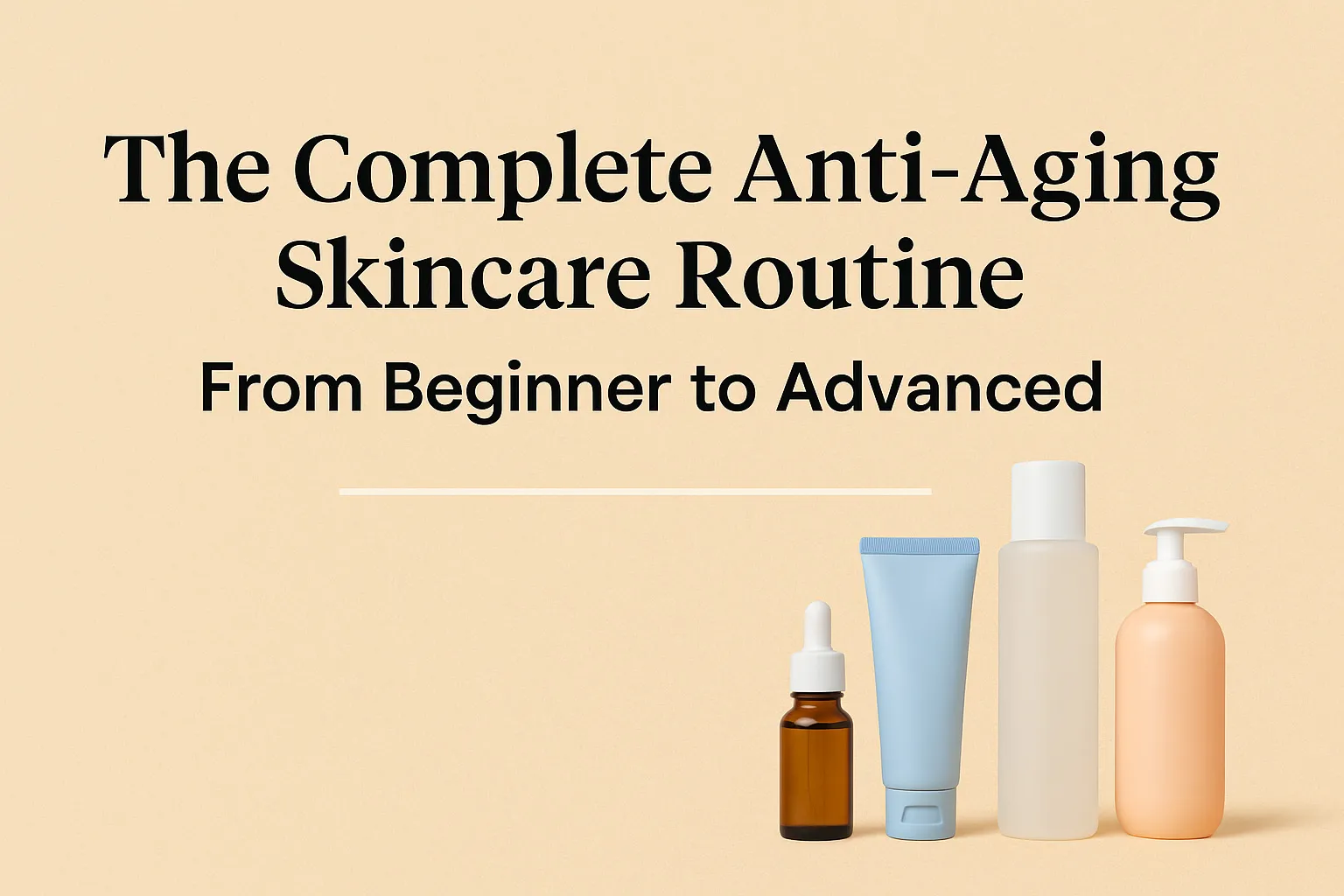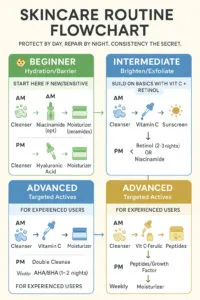Why Consistency Beats Complexity
Building an effective anti-aging skincare routine doesn’t have to be complicated. The most effective skincare results emerge from basic routines that people can maintain in their daily lives. The Ultimate Guide to Anti-Aging Skincare provides essential information on how ingredients work together and how skin transforms with age, enhancing the effectiveness of your skincare regimen.
The fundamental principle of an anti-aging skincare routine is simple: consistency matters more than complexity. The key to achieving skin transformation lies in maintaining a few scientifically proven basic skincare practices instead of following elaborate 10-step routines with expensive products.
Studies demonstrate that regular twice-daily skincare routines with basic cleansers and moisturizers lead to significant improvements in skin hydration, texture, and overall health for users who maintain their routine. This is in contrast to those who frequently switch products or skip essential steps. The correct application of products in sequence helps your skin barrier function properly, reduces collagen deterioration, and makes aging signs less noticeable with continued use.
Tip: Most active ingredients such as retinol and vitamin C require 6–12 weeks to produce noticeable effects. You should avoid making product changes during the first 6–12 weeks of treatment.
AM Routine Essentials — Protect & Hydrate
Your defense strategy begins with morning skincare practices. The combination of hydration and protection should be your main priority because UV rays and pollution accelerate the aging process.
- Cleanser: A non-stripping, gentle cleanser that removes oil from the skin while preparing it for the next steps.
- Antioxidant Serum: The antioxidant serum contains Vitamin C or niacinamide, which functions to combat free radicals.
- Mousturizer: The moisturizer contains ceramides or hyaluronic acid, which provide hydration to the skin.
- Sunscreen: Apply broad-spectrum sunscreen with SPF 30+ as your number one anti-aging protection every morning.
Science-backed support: Daily sunscreen use can reduce visible signs of aging by up to 24% over four years, according to Harvard Health Publishing.
PM Routine Essentials — Repair & Rebuild
Your skin starts repairing itself during nighttime hours. The application of active ingredients during this time helps your skin produce collagen while it replaces cells and fixes its protective barrier.
The following steps outline your nighttime skincare routine:
Cleanser: Start with a double cleansing process when you have sunscreen or makeup on your face.
Treatment (optional): Exfoliating acids should be used as a treatment product 2 to 3 times per week.
Active Serum: The active serum contains retinol, peptides, or niacinamide, which work to repair aging skin.
Moisturizer / Night Cream: The combination of moisturizer and sleeping cream functions to protect your skin from dryness while maintaining its natural barrier throughout the night.
Pro Tip: Apply retinol to dry skin before adding a moisturizing product to reduce potential irritation.
Beginner Routine (3 Steps)
If you’re new to skincare, start with this minimal, barrier-friendly routine:
AM
- Cleanser
- Moisturizer
- Sunscreen
PM
- Cleanser
- Moisturizer
Optional Add-On: Niacinamide serum (calms skin and improves texture).
Intermediate Routine (5 Steps)
Once your skin adjusts, you can start layering proven actives.
AM
-
Cleanser
-
Vitamin C or Niacinamide Serum
-
Moisturizer
-
Sunscreen
PM
-
Cleanser
-
Retinol or Peptide Serum
-
Moisturizer
Optional Add-On: Exfoliating toner with lactic or glycolic acid (1–2 × per week).
Longevity Decoder Tip: Always patch-test new products before adding them to your whole routine.
Advanced Routine (7 Steps)
For experienced users or those targeting multiple concerns (wrinkles, dullness, uneven tone):
AM
-
Cleanser
-
Antioxidant Serum (Vitamin C)
-
Hydrating Serum (Hyaluronic Acid)
-
Moisturizer
-
Sunscreen
PM
-
Cleanser (Double Cleanse if needed)
-
Retinoid or Peptide Serum
-
Barrier Repair Cream or Overnight Mask
Optional Add-Ons:
-
Microcurrent or LED device (2–3 × per week)
-
Exfoliating acid on alternate nights
Alternate actives: Retinol one night, acids the next—never both together.
Common Mistakes in Layering Products
Even great ingredients can become ineffective when misused. The following mistakes should be avoided in your skincare routine:
- Mixing Vitamin C and Retinol: Vitamin C should be applied in the morning, separate from Retinol, which should be used in the evening.
- Skipping sunscreen after actives – Not applying sunscreen after using active ingredients exposes your skin to UV damage, which can undo all your progress.
- Over-exfoliating – more than twice per week will cause damage.
- Ignoring barrier repair: When your skin becomes dry and tight, it indicates that you have overdone it with your skincare products.
Golden rule: Place hydrating products between your active treatments. You should always sandwich treatments between two hydrating layers.
Routine Builder: Customize for Your Skin Type
- Dry Skin: Focus on creamy cleansers, ceramide moisturizers, and hydrating serums.
- Oily/Combination: Use gel cleansers, niacinamide, and lightweight moisturizers.
- Sensitive Skin: Stick to fragrance-free, barrier-repair products; introduce actives slowly.
- Mature Skin: Combine peptides, retinoids, and antioxidants for full-spectrum repair.




